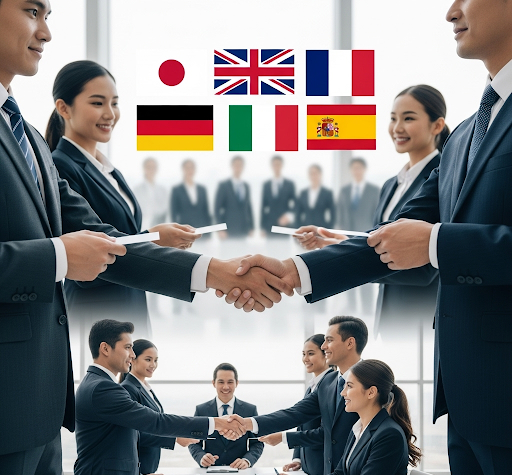Essential Cultural and Practical Tips for Successful International Business
Introduction
With the progress of globalization, Japanese companies have increasing opportunities to do business with European firms. However, each European country has its own unique business etiquette and values, and what is considered common sense in Japan may not always apply. In this article, we focus on the United Kingdom, France, Germany, Italy, and Spain, and provide detailed explanations of the differences with Japan, along with practical advice for working smoothly across cultures.
1. Greetings, Exchanging Business Cards, and First Impressions
Japan
- Bowing is the standard greeting, with specific meanings depending on depth and angle.
- Business cards are exchanged politely with both hands, showing respect.
- It is common to address people by their title and company name on first meetings.
United Kingdom
- A light handshake and direct eye contact are the norm.
- Business cards are exchanged, but not as formally or ritualistically as in Japan—often exchanged naturally during conversation.
- People are usually addressed by title plus surname, but first names may be used once a relationship is established.
France
- Handshakes are standard in business settings. Among friends, cheek kissing (la bise) is common, but rare in business.
- Business cards can be given with one hand, and there’s little strict protocol.
- Addressing by title and surname is polite, especially at first.
Germany
- Firm handshakes with eye contact are important.
- Business cards are exchanged at the start of meetings; cards often include job title or academic degree.
- It is standard to use titles and surnames unless invited to be less formal.
Italy
- Handshakes are typical, and people may use both hands or touch the other’s arm for warmth.
- Business card exchanges are informal and flexible.
- Titles and surnames are used at first, but first names may follow as you build rapport.
Spain
- Handshakes are common; among friends, cheek kisses may occur.
- Exchanging business cards is standard but not strictly regulated.
- Surnames and titles are generally used, but a friendly atmosphere is quickly established.

Need a quick break? Try Rocket Now! Get 5,000 Yen Coupon!
2. Meetings, Negotiations, and Decision-Making
Japan
- Consensus building is highly valued, and hierarchy plays a significant role.
- Silence is respected as time for thinking, and not interrupted.
- Decision-making is slow and careful, often requiring several meetings.
United Kingdom
- Punctuality is strictly observed, and meetings are run efficiently.
- Logical, constructive discussion is favored, often with a touch of humor.
- Decisions are made rationally and relatively quickly.
France
- French professionals enjoy lively debate and frank exchanges of ideas.
- Decision-making tends to be top-down, with senior management having the final say.
- Even heated discussions are seen as part of intellectual engagement, not personal attacks.
Germany
- Thorough preparation and clear agendas are expected; documents are usually reviewed in advance.
- Communication is logical and detailed, avoiding vagueness.
- Input from all is respected, but the final decision is usually made by the top.
Italy
- Meetings are flexible; conversations can go off track, but passion and enthusiasm are valued.
- Decisions are often top-down, but trust and relationships are key.
- Expressive communication is encouraged.
Spain
- Meetings are relaxed and friendly, often including jokes and small talk.
- Decision-making is usually top-down but open to input.
- Time is more flexible, and schedule changes happen often.
3. Dress Code and Appearance
Japan
- Conservative suits and ties are standard; cleanliness and understated colors are important.
- Flashy accessories or overly individualistic fashion are avoided.
United Kingdom
- Formal attire (dark suits and ties) is preferred, with attention to appropriateness for the occasion.
- Dress codes such as “casual Fridays” exist, but vary by industry.
France
- Stylish, elegant attire is highly valued.
- Moderate self-expression through brand or fashion sense is acceptable.
Germany
- Simple, high-quality clothing is preferred—neat but not flashy.
- Business casual is increasing in some industries, but formal wear is safe for first meetings.
Italy
- Strong emphasis on fashion, current trends, and brands.
- Cleanliness and a good sense of style are important.
Spain
- More casual styles are acceptable, but neatness is still valued.
- Due to the climate, seasonally appropriate clothing is important.
4. Communication Styles & Common Misunderstandings
Japan
- Indirect language and “reading the air” (tuning in to unspoken feelings) are valued.
- People avoid saying “no” directly, preferring softer, ambiguous expressions.
United Kingdom
- Politeness, understatement, and humor (often ironic or subtle) are common.
- Rejection or disagreement is often phrased gently (“That’s interesting” can mean disinterest).
France
- Direct and intellectual debate is appreciated; people are passionate about their views.
- Stating one’s opinion clearly is seen as positive.
Germany
- Clear, logical communication is the norm; ambiguity is avoided.
- Directness is not considered rude, but efficient.
Italy
- Expressive speech and gestures are normal; conversations are lively.
- Interruptions are common and not viewed as impolite.
Spain
- Open, friendly conversation is valued.
- Small talk and building rapport are important, even in business.
5. Business Meals & Socializing
Japan
- Business meals and outings are important for building trust.
- Seating order and etiquette around toasts are observed.
United Kingdom
- Business lunches are relatively formal; alcohol is limited.
- Even in social settings, people avoid overly personal topics.
France
- Business lunches are often long and may include wine.
- Conversation during meals is considered part of building business relationships.
Germany
- Lunch is quick and efficient; beer may be served, but topics remain professional.
- Personal topics are generally avoided.
Italy
- Meals, especially dinner, are important opportunities to deepen relationships.
- Etiquette and appropriate conversation topics matter.
Spain
- Lunches can start late (after 2pm) and are long, focusing on relationship-building rather than business.
- Enjoying the meal and conversation is key.
6. Summary & Advice
Each European country has its own distinct business manners and values. Japanese customs, such as reading the atmosphere and detailed etiquette, differ greatly from the more direct and expressive cultures of Europe. However, understanding and respecting these differences is the key to successful international business.
Practical Tips
- Research the business etiquette of your counterpart’s country in advance.
- Don’t hesitate to ask questions if you are unsure.
- Pay attention to first impressions and dress appropriately.
- Communicate clearly, but always respect the other party’s style.





コメント